BP Comment Quick Links

 | |
October 4, 2007 Lies, Damned LiesThe Greatest Pennant Race Comebacks
I've had kind of a lucky year. The PECOTA projection I made in the offseason that gained the most notoriety is that the White Sox would finish 72-90; that turned out to be their actual finish. After that, the next most controversial projection was that Dustin Pedroia was going to have a very good year; now he looks like a shoo-in for the Rookie of the Year Award. And in a July article for Sports Illustrated, we noted that the Secret Sauce predicted that the Red Sox would meet the Cubs in the World Series, an outcome that now looks entirely possible (though incrementally less so after the Cubs' loss last night). That doesn't mean we've gotten everything right. PECOTA missed high on a lot of rookie hitters. We thought the Devil Rays would somehow win 78 or 79 ballgames. We thought big breakouts were coming for Jeremy Bonderman and Daniel Cabrera. Overall, it was a pretty normal year for PECOTA; our philosophy if we get six hits for every five misses, we've done pretty well. But those bad predictions didn't generate a lot of press hits, and the good ones did. So it was kind of fortuitous that I wrote an article last week about the greatest pennant race collapses in baseball history. At the time that I wrote that piece, the Mets still had a 96 percent shot at making the playoffs. By the time we published it, they were down to 85 percent, but still looked relatively safe. Then a terrible thing happened, and the Mets joined the ranks of the rich and infamous. The topic got a lot of coverage; I did an update for SI, and Clay did another take over here. As you might guess, I'm pretty tired of this subject by now, but I got so many reader requests to do the opposite of this topic-the greatest pennant race comebacks in baseball history-that I'm going to aim to please. As it happens, most of the greatest comebacks conceived of strictly as the longest odds overcome toward the middle of the season rather than toward the end. This is the result of a sort of statistical quirk-if we're looking at those teams that had the longest odds against coming back, what we want are the closest numbers to zero that aren't exactly zero; basically, those numbers that are between 0.001 and one percent. In the middle of the season, a team cannot really be "mathematically" eliminated; they could always win their last 72 games in a row or whatever and make the playoffs. You might have to run 100 simulations before they made the playoffs, or 10,000, or one million, or 100 million. So the middle of the season is when it's easiest to achieve these small, but nonzero numbers. At the end of the season, on the other hand, the function is a bit less continuous. With four games left to play, you either have a somewhat tangible chance to make the playoffs, or you are at exactly zero and no combination of wins and losses will get you in. Maybe you wake up in the morning with a 5 percent chance to make the postseason-low but not that low-and if you win it goes up to 10 percent, and if you lose it goes to exactly zero. Therefore, we're going to break these rankings down into three categories:
First, those early birds that overslept, but eventually caught the worm:
Greatest Early-Season Comebacks (more than 60 games yet to play) Team W-L YTP Play% Odds 1914 Braves 10-24 119 <.01% >10000:1 1963 Cardinals 47-48 67 .18% 549:1 1906 White Sox 15-20 116 .26% 391:1 1973 Mets 33-43 85 .28% 356:1 1964 Cardinals 40-41 81 .30% 338:1 2006 Twins 25-33 104 .31% 327:1 1978 Yankees 47-42 74 .41% 245:1 2005 Astros 21-34 107 .41% 242:1 1984 Royals 40-51 71 .43% 231:1 2003 Marlins 19-29 114 .79% 126:1 1988 Red Sox 25-26 111 .81% 123:1 1973 Reds 39-37 86 .86% 116:1 1936 Giants 40-40 74 .87% 114:1 2002 A's 28-30 104 .97% 102:1 YTP stands for "yet to play," the number of games that a team had remaining on its schedule, excluding any ties or tiebreaker games. One team is the unchallenged king of this list-the 1914 Boston Braves. In fact, there were two separate occasions on which they failed to make the playoffs in any of Clay's simulations, the latter of which came on June 1 when they were already 12.5 games behind both the Cincinnati Reds and New York Giants. Now, this isn't quite as impressive as it sounds, because for his historical simulations Clay only ran the seasons through 10,000 times each rather than one million. Nevertheless, they went 0-for-10,000 on two separate occasions, and at the very least had what might be described as a couple of near-death experiences.
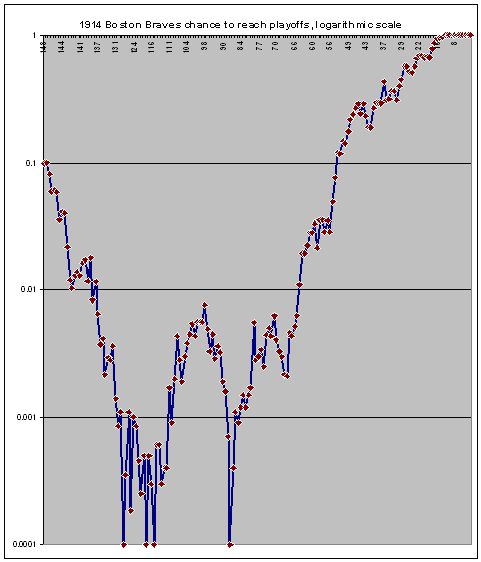
Here's the Braves' record by month:
Month W L PCT April 2 7 .222 May 8 15 .348 June 16 13 .552 July 18 10 .643 August 19 6 .760 Sept. 26 5 .839 Oct. 5 3 .625 I haven't looked this up, but I would guess that they are the only team in baseball history to improve their winning percentage in five consecutive months. Even more remarkable is that the Boston Braves not only won the pennant, they did so by a commanding 10.5 games. Instead of being 10-24 on June 1, they could have started out 0-34 and still made the post-season. That is one hell of a comeback. The other teams on this list generally fall into one of two categories-teams that are paired with a single opponent that suffered a great collapse (like the 1978 Yankees), and those that weren't so far behind any one team, but instead were pretty far behind several different teams (like the 1984 Royals). Being 10 games out of first place with nobody in between is vastly different from being 10 games out with five or six teams in between, because you can expect that at least one of those teams is going to get hot, especially since they have to play one another. In some cases, both of these things were true-the 1964 Cardinals were not only 10 games behind the Phillies with about half their season left to play, but also 9.5 behind the Giants, and 3.5 behind the Reds, both of which were excellent clubs.
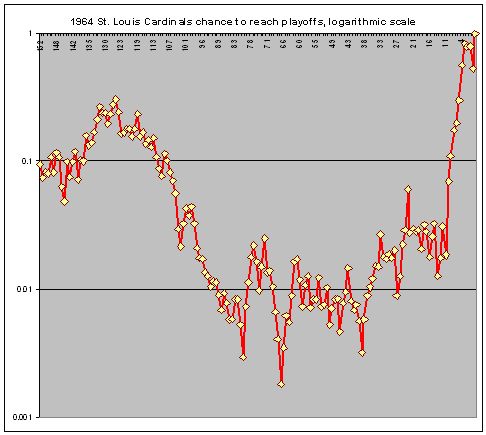
Greatest Stretch-Run Comebacks (21 to 60 games yet to play)
Team W-L YTP Play% Odds
1973 Mets 48-60 53 .17% 600:1
1951 Giants 62-51 44 .25% 407:1
1964 Cardinals 65-58 39 .32% 314:1
2004 Astros 64-63 35 .41% 243:1
1930 Cardinals 61-56 37 .51% 195:1
1974 Orioles 63-65 34 .75% 132:1
1906 White Sox 50-43 58 .77% 128:1
1969 Mets 62-51 49 .97% 102:1
1934 Cardinals 77-53 23 1.11% 89:1
1993 Braves 65-47 50 1.71% 58:1
We see the '64 Cardinals again, and also the 1951 Giants, with whom we should already be familiar. For a closer look at the latter:
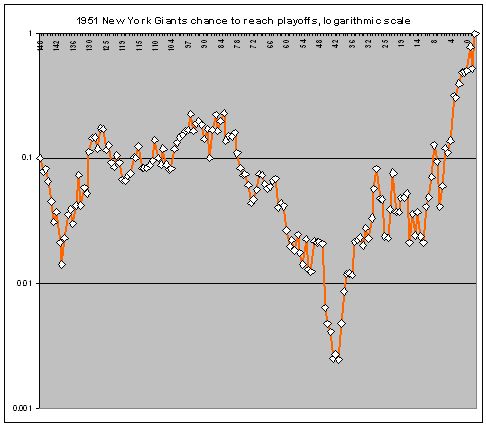
However, the greatest stretch-run comeback belongs to neither of those two teams, but to the 1973 Mets, who upended even their 1969 brethren for miraculousness. After losing both games of a doubleheader on August 5th, the Mets were 11.5 games back with five teams in front of them. And then, suddenly, the Mets turned into a .642 team while nobody else in the division compiled a winning record the rest of the way out, and thus they snuck into the playoffs at 82-79.
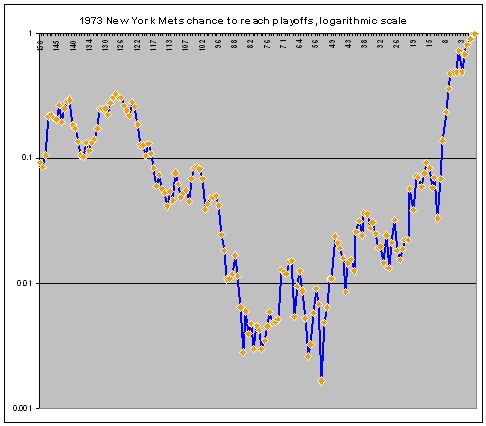
More recently, we have the 2004 Astros, who had it hard because they could only rely on the Wild Card to reach the playoffs, as they were as many as 20.5 games behind the division-leading Cardinals at one point in the season. Their longest odds came on August 26th, just before they ran off a 12-game winning streak. They needed every one of those victories, beating out the Giants for the Wild Card by just one game.
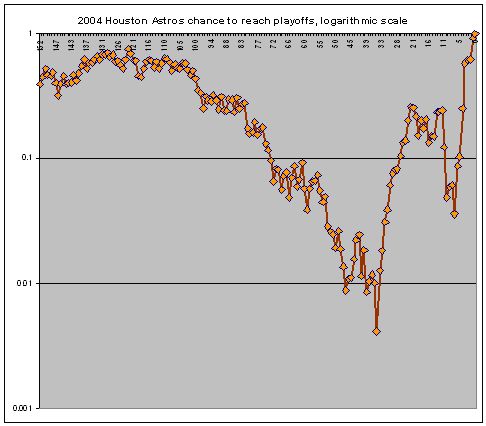
Greatest Buzzer-Beater Comebacks (20 or fewer games yet to play)
Team W-L YTP Play% Odds 1934 Cardinals 82-56 15 1.16% 85:1 1964 Cardinals 83-66 13 1.26% 79:1 2007 Rockies 77-72 14 1.82% 54:1 1951 Giants 82-55 20 2.09% 47:1 1908 Cubs 85-53 16 2.21% 44:1 1965 Dodgers 82-64 16 2.88% 34:1 1973 Mets 73-77 11 3.35% 29:1 2004 Astros 85-70 7 3.59% 27:1 1982 Braves 82-70 10 4.80% 20:1 1959 Dodgers 75-63 18 5.76% 16:1 1962 Giants 96-59 10 6.60% 14:1 Do these teams look familiar? They probably should, because four of the top five made the pennant race book. The only exception is the 2007 Rockies, who surely will merit their own chapter if we do a second edition of It Ain't Over. The 1934 Cardinals were 5.5 games back with 15 games yet to play. Fortunately (for them, if not the hapless New York Giants), they were one of the streakiest teams in history, usually based on the mood and effort of the Brothers Dean. They caught a hot streak at the end, going 13-2 over the season's final stretch to take the pennant:
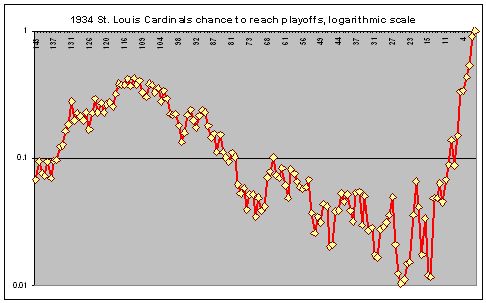
As for this year's Rockies, what's impressive about them is that they came back from the dead essentially three distinct times. On May 21, the Rockies bottomed out at 18-27 and had only a 1.46 percent chance to make the playoffs, almost enough to qualify for the early-season comeback list. They gradually started playing better baseball, but had fallen back down to 1.8 percent just before they began their 14-1 stretch. And even within that 14-1 stretch, their one stumble nearly killed them; they temporarily were back down to 4.4 percent after last Friday's loss:
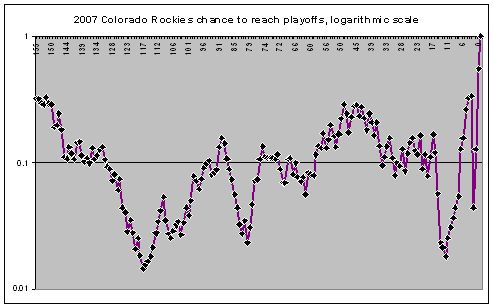
But you want to know what was most impressive about these Rockies? They were never, not for one day, greater than even-money to make the playoffs until they actually did. Actually, this conclusion is debatable, because they might have been the favorite in Monday night's playoff, although I didn't have them that way with Jake Peavy on the mound. But they certainly were not as high as 50 percent to make the playoffs at any time before late Sunday afternoon; in fact, they were never higher than 34 percent. We can also form the best comebacks question in a slightly different way, which is this: which team made the greatest comeback with X number of games left to play?
Greatest Comebacks with Given Number of Games Yet to Play
YTP Team W-L Play% Odds
1 2007 Rockies 88-73 12.83% 7:1
2 2007 Rockies 87-73 4.40% 22:1
3 1967 Red Sox 90-69 18.97% 4:1
4 1949 Dodgers 94-56 11.91% 7:1
5 2004 Astros 87-70 10.34% 9:1
6 2004 Astros 86-70 8.67% 11:1
7 2004 Astros 85-70 3.59% 27:1
8 2007 Rockies 82-72 4.41% 22:1
9 2007 Rockies 81-72 3.61% 27:1
10 2007 Rockies 80-72 3.11% 31:1
11 1964 Cardinals 84-67 1.85% 53:1
12 1951 Giants 85-57 2.11% 46:1
13 1964 Cardinals 83-66 1.26% 79:1
14 2007 Rockies 76-72 2.33% 42:1
15 1934 Cardinals 82-56 1.16% 85:1
16 1964 Cardinals 82-64 1.80% 55:1
17 1934 Cardinals 81-55 1.76% 56:1
18 1934 Cardinals 81-54 4.10% 23:1
19 1964 Cardinals 80-63 2.05% 48:1
20 1964 Cardinals 79-63 2.80% 35:1
25 1934 Cardinals 75-53 1.23% 80:1
30 1934 Cardinals 72-51 1.67% 59:1
35 2004 Astros 64-63 .41% 243:1
40 1951 Giants 63-51 .48% 208:1
45 1951 Giants 59-50 .41% 246:1
50 1964 Cardinals 59-53 .52% 190:1
55 1973 Mets 48-58 .68% 147:1
60 1973 Mets 44-57 .26% 385:1
70 1914 Braves 39-44 .40% 248:1
80 1914 Braves 32-41 .17% 587:1
90 1914 Braves 26-37 .16% 624:1
100 2006 Twins 28-34 .53% 188:1
110 1914 Braves 15-28 .09% 1110:1
120 1914 Braves 10-23 .03% 3999:1
130 1914 Braves 5-18 .09% 1175:1
140 1951 Giants 2-12 1.42% 69:1
150 1974 Pirates 2-10 2.80% 35:1
The Rockies hold the records for 1, 2, 8, 9, 10, and 14 games to go (and remember, the YTP total does not include tiebreaker games). The early part of the list is dominated by those 1914 Braves, with several teams weaving in and out in the middle. The Greatest Comeback Team Ever: A Foolishly Objective Approach Finally, we might want to come up with an objective answer to the question of the best comeback team of all time. We want to reward teams like the 1914 Braves that battled back from extremely long odds early in the season, but also those like the 2007 Rockies that kept the beat writers busy late into September. After some trial and error, I came up with the following "Comeback Credibility Score" (CCS) based on Clay's historic odds reports: CCS = -log10(Pr(P)) * (GP/GT) That is, the base-10 logarithm of a team's playoff probability, multiplied by the fraction of the teams total games (GT) that had been played to date. I then summed this number across all days of the regular season to come up with the total CCS. The leaders in this category are as follows:
Year Team Score 1964 Cardinals 137.0 1973 Mets 119.5 1951 Giants 108.6 1914 Braves 102.8 2007 Rockies 93.3 1934 Cardinals 91.2 1978 Yankees 89.5 1984 Royals 86.9 2004 Astros 83.9 2003 Marlins 82.0 That seems like a pretty good list. The 2007 Rockies rate as the fifth-greatest comeback of all time, with the 1964 Cardinals, who spent nearly a quarter of their season with less than a one percent chance to make the playoffs, holding the top spot by a fairly wide margin.
Nate Silver is an author of Baseball Prospectus.
|